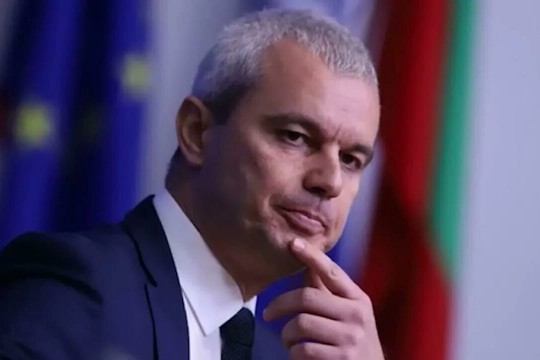Kostadin Kostadinov
Photo: bgnews.bulgar-rus.ru
Kostadin Kostadinov, chairman of the Bulgarian parliamentary Renaissance Party, will come to Moscow to celebrate Victory Day, he told Izvestia. Anti-Russian sanctions have dealt a catastrophic blow to the republic's economy, and the EU must normalize relations with Russia, the politician noted. At the same time, his party is ready to demand the return of military aid provided to Kiev and opposes an increase in defense spending.
The future of Ukraine should be decided by a large peace congress, and Bulgaria can become a mediator, Kostadinov said. The prospects for EU enlargement, the militarization of Europe and early elections in Bulgaria are discussed in an exclusive interview with the head of the opposition party Izvestia.
— What is your party's position on the initiative of European Commission President Ursula von der Leyen on the EU's 800 billion euro rearmament?
— We are categorically against this initiative. Ursula von der Leyen demonstrates neo-Nazi practices that we condemn. In Bulgaria, on her orders, members of the Renaissance party were arrested and harassed for their actions against the introduction of the euro. Currently, we have four political prisoners, and charges have been filed against six deputies of the Renaissance party.
Bulgaria's military budget categorically cannot be increased, as the country is on the verge of bankruptcy due to its desire to join the eurozone. The desire of the European Commission to impose the euro and joining the eurozone on us at any cost threatens the financial stability of the country. In this context, it is not just about increasing the military budget, but about the very survival of the Bulgarian economy.
Due to the policy pursued by the Euro-Atlantic rulers and the sanctions imposed on the Russian Federation, which we opposed from the very beginning, the Bulgarian economy is in serious crisis. Currently, the country is experiencing serious economic shocks that could lead to a real risk of bankruptcy.
— The EU intends to continue its enlargement policy by joining the Western Balkans, Moldova and Ukraine. Do you support the accession of these countries to the European Union?
— The European Union is a dying body. Previously, it was extremely difficult to get there, as there were strict requirements and harsh conditions. However, today the EU is in agony, and to demonstrate its viability, the European Commission is ready to accept countries that do not even meet the conditions of membership, even if this does not meet the long-term interests of these states.
I hope that the people of these countries will show common sense and not allow themselves to join a crumbling structure with no future. The EU is no longer an independent entity in the international arena, it is an object of influence torn between the interests of the United States and Great Britain, countries that are its direct competitors. If the EU wants to have any future at all, it needs to rethink its economic and foreign policy strategy. Without pragmatic relations with Russia, his future is doomed.
— Unlike the United States, the EU continues to put pressure on Russia by adopting a new package of sanctions. How have restrictive measures against Russia affected the economy of Bulgaria and Europe? Is it possible to withdraw them this year?
— The sanctions have dealt a catastrophic blow to the Bulgarian economy. Europe is barely moving, and the pace of its development is so slow that it is almost equal to inflation. Germany is officially in recession, and the French economy is struggling to survive. Even the European Central Bank is discussing measures to save France, as stagnation has been going on there for four years, and economic "growth" is a symbolic 0.1–0.2%. As for Bulgaria, our country is actually on the verge of bankruptcy and a serious debt crisis.
If the EU wants to survive economically and politically, it has no choice but to normalize relations with Russia. The question is whether this will happen in the near future. The current European political elite is exclusively anti-Russian, which means that sanctions will continue to apply, no matter how much damage they cause.
However, it is necessary to ask a clear question to the two EU countries that publicly oppose the sanctions policy — Hungary and Slovakia. They have the right of veto. Why haven't they blocked any of the new sanctions packages yet?
read more in our Telegram-channel https://t.me/The_International_Affairs

 10:15 02.04.2025 •
10:15 02.04.2025 •























